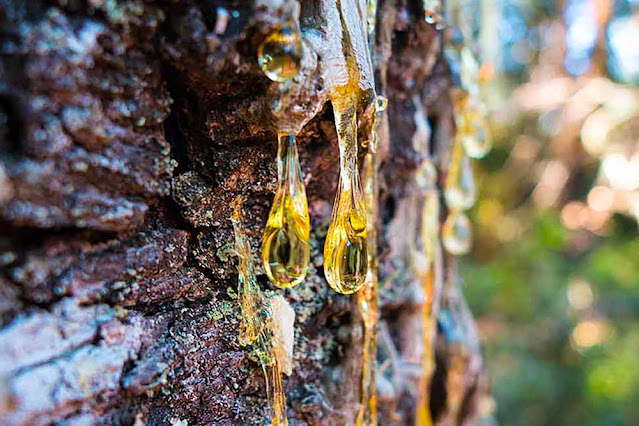 |
| Pine Resin |
Pine resin, derived
from pine trees, has gained attention as a sustainable alternative to synthetic
adhesives due to its eco-friendly properties and versatility in various
applications.
- Natural Origin:
Pine resin is a natural substance obtained from the sap of pine trees.
Unlike synthetic adhesives, which are often derived from petrochemicals,
pine resin is renewable and biodegradable, making it a more sustainable
choice for adhesive applications.
- Adhesive Properties:
Pine
Resin contains sticky compounds that enable it to adhere to
various surfaces effectively. When heated or dissolved in solvents, pine
resin forms a tacky, adhesive substance that can bond materials together,
making it suitable for use in woodworking, crafting, and other
applications.
- Environmental Benefits:
Using pine resin as an adhesive offers several environmental benefits.
Since it is derived from renewable pine trees, harvesting pine resin does
not deplete natural resources or contribute to deforestation.
Additionally, pine resin-based adhesives are biodegradable, meaning they
break down naturally over time without causing harm to the environment.
- Versatility:
Pine resin can be used as a standalone adhesive or combined with other
natural ingredients to enhance its properties. For example, mixing pine
resin with beeswax creates a durable and waterproof adhesive suitable for
outdoor applications like boat building and outdoor furniture assembly.
- Reduced Toxicity:
Synthetic adhesives often contain volatile organic compounds (VOCs) and
other harmful chemicals that can off-gas into the air, posing health risks
to humans and the environment. In contrast, pine resin-based adhesives are
generally non-toxic and emit fewer harmful substances, making them a safer
option for indoor use.
- Cultural and Historical
Significance: Pine resin has been used as an
adhesive for centuries by indigenous cultures around the world. Its
historical use highlights its effectiveness and durability as an adhesive
material, further supporting its role as a sustainable alternative to
synthetic adhesives.
- Support for Local Economies:
Harvesting and processing pine resin can provide economic opportunities
for communities in forested areas. By promoting the use of locally sourced
pine resin, consumers can support sustainable forestry practices and local
economies while reducing their reliance on synthetic adhesives produced
from non-renewable resources.
- Challenges and Considerations:
While pine resin offers many benefits as an adhesive, there are also
challenges to consider. Processing and refining pine resin into a usable
adhesive require specialized equipment and knowledge, which may be
inaccessible to small-scale producers. Additionally, the availability of
high-quality pine resin may vary depending on factors such as climate,
tree species, and harvesting practices.
- Future Outlook:
As interest in sustainability grows, pine resin-based adhesives are likely
to become increasingly popular as an eco-friendly alternative to synthetic
adhesives. Research and innovation in the field of natural adhesives are
expanding, leading to the development of new formulations and applications
for pine resin and other renewable materials.
Pine resin offers a
sustainable alternative to synthetic adhesives, with its natural origin,
adhesive properties, environmental benefits, and cultural significance making
it an attractive option for various applications. By incorporating pine
resin-based adhesives into their projects and products, individuals and
industries can contribute to a more sustainable and eco-friendly future.
